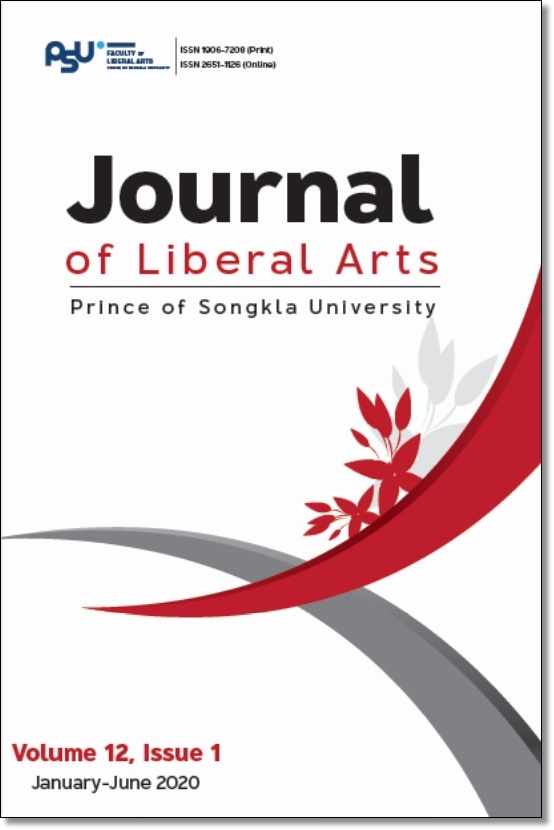Associating the Point between President Ho Chi Minh’s Lack of Descendants and the Easterners’ Son Preference Attitude
Keywords:
Easterners’ attitude, President Ho Chi Minh, son preferenceAbstract
The purpose of this research is to associate the point between President Ho Chi Minh’s lack of descendants and the Easterners’son preference attitude, as well as to find the reason for such phenomenon by the use of documentary method. It was found that to give birth to descendants is one of the important duties of Vietnamese. Consequently, when President Ho Chi Minh broke this tradition, he faced several problems. The Vietnamese’s attitude towards son preference is in conformity with the information indicated in sacred books and several Indian mythology books, i.e. “Upanishads”, “Indian Tales”, and “The Pilgrim Kamanita”, as well as famous Chinese and Thai literature, i.e. “The Romance of Three Kingdoms” and “Lai Jivit”. There are four reasons for son preference of Easterners. Firstly, it is for continuity and succession of family that will make parents attain the state of physical immortality. Secondly, it is for performing ancestor veneration since only men can perform this sacred rite. Thirdly, it is in accordance with the natural law because it will bring about the balance in society. If there is only death without any birth to replace the previous generation, human societies will come to an end. Fourthly, it is to respond to the need of combating in warfare that has happened in Eastern societies from the past up to now.
References
Cambell, J., & Moyers, B. (2008). The power of myth (Boonsong. B, Trans.) (2nd ed.). Amarin Printing and Publishing. [in Thai].
Chanchaowat, S. & Thein, M. T. (2014). The worldviews of Myanmar from proverbs. Daongan Printing.
Duong, T. (2010). 108 daily stories of Uncle Ho. Dan Tri Publishing House.
Hang, T.T. (2015). An analysis of the folktale values for integrating in learning and teaching: A case study of the comparison between ‘Tam Cam’ and ‘Nang Uththra’. Lampang Rajabhat University. [in Thai].
Hang, T.T. (2016). The wedding. Lampang Rajabhat University Journal, 5(2), 211-234.
Jitprakong, P. (2010, July 29). Influence of Confucianism on pre colonialVietnam. http://www.thaiworld.org/th/thailand_monitor/answer.php?question_id=1162.
N.M.S. (2000). The tales of Vetala. Bangkok Book. [in Thai].
Plato. (2555). Symposium. (Attagara. K, Trans.). Amarin Printing and Publishing. [in Thai].
Praphananda, S., & Manchester, F. (2010). Upanishads (Attagara. K, Trans). Amarin Printing and Publishing. [in Thai].
Pramoj, K (M.R.). (2010). Lai Jivit. Dokya Printing. [in Thai].
Petrie, W. M. F. (2550). Egyptian tales. (Attagara. K, Trans.). Amarin Printing and Publishing. [in Thai].
Sathiankoset. (1988). Wedding traditions. MaeKamPhang. [in Thai].
Sathiankoset-Nakapratheep. (2008). Hitopadesa. Siam. [in Thai].
Sathiankoset-Nakapratheep. (2009). The Pilgrim Kamanita. Siam Printing. [in Thai].
Sieu, T. M. (2008). Relatives in Uncle Ho’s family. Nghe An Publishing House. [in Vietnamese].
Tangchonlatip, K. (2008). Gender imbalance in son preference countries. Population and Society. [in Thai].
Taylor, B. (2005). The romance of three kingdoms (Volume I). Silk Pagoda. [in English].
Thanh, S. (2010). Ho Chi Minh, Biography. National Political Publishing House. [in Vietnamese].
The Royal Institute of Thailand. (2013). Thai dictionary by the Royal Institute 2013. (2nd ed.). Nanmeebooks Publications. [in Thai].
Yaemnatda, S. (2547). Indian tales. Parbpim Printing. [in Thai].
Yogananda, P. (2011). Autobiography of a Yogi. Amarin Printing and Publishing. [in Thai].
Downloads
Published
How to Cite
Issue
Section
License
The authors retain the copyright to their article but the Journal of Liberal Arts, Prince of Songkla University reserves the exclusive rights to first publication.






